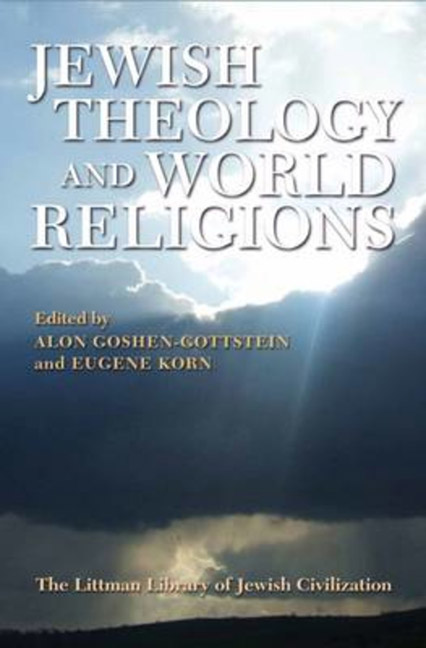Book contents
- Frontmatter
- Dedication
- Preface
- Contents
- Note on Transliteration
- Towards a Jewish Theology of World Religions: Framing the Issues
- PART I PHILOSOPHICAL PERSPECTIVES ON JEWISH PLURALISM
- 1 Jewish Views of World Religions: Four Models
- 2 Justifying Interreligious Pluralism
- 3 Pluralism out of the Sources of Judaism: The Quest for Religious Pluralism without Relativism
- 4 Respectful Disagreement: A Response to Raphael Jospe
- PART II JUDAISM AND THE OTHER
- PART III JUDAISM AND WORLD RELIGIONS
- Concluding Reflections
- Notes on the Contributors
- Index
3 - Pluralism out of the Sources of Judaism: The Quest for Religious Pluralism without Relativism
from PART I - PHILOSOPHICAL PERSPECTIVES ON JEWISH PLURALISM
- Frontmatter
- Dedication
- Preface
- Contents
- Note on Transliteration
- Towards a Jewish Theology of World Religions: Framing the Issues
- PART I PHILOSOPHICAL PERSPECTIVES ON JEWISH PLURALISM
- 1 Jewish Views of World Religions: Four Models
- 2 Justifying Interreligious Pluralism
- 3 Pluralism out of the Sources of Judaism: The Quest for Religious Pluralism without Relativism
- 4 Respectful Disagreement: A Response to Raphael Jospe
- PART II JUDAISM AND THE OTHER
- PART III JUDAISM AND WORLD RELIGIONS
- Concluding Reflections
- Notes on the Contributors
- Index
Summary
THE CHALLENGE OF TOLERATION VERSUS PLURALISM: ALEXANDER ALTMANN AND AVI SAGI
IN HIS 1957 lecture before the Council of Christians and Jews in London, my teacher Alexander Altmann discussed tolerance and the Jewish tradition. In Altmann's analysis, Jews in the biblical and rabbinic periods found ways to tolerate non-Jews while rejecting internal toleration of Jewish dissent. Altmann then argued that Jews and Christians today meet on secular ground, while their theologies remain mutually exclusive. Therefore, he concluded, although theologically Jews and Christians cannot ‘tolerate’ each other's religions, they need each other for a common stand in the face of contemporary ‘virulent paganism’. Thus, while theology divides; religion, which is broader than theology, can bring the two groups together by emulating God's love.
Altmann's lecture, of course, was given prior to the radical changes in Christian–Jewish relationships since Vatican II, and could not take into account later developments. He questioned the possibility of theological toleration; half a century later, we face the question of whether we can move from mere toleration to a pluralistic acceptance of each other. Nevertheless, Altmann's perceptive distinction of internal or intra-Jewish toleration of dissent from external, interreligious toleration continues to challenge Jews involved in interreligious dialogue and promoting pluralism today, and was a problem explicitly addressed some two centuries previously by Moses Mendelssohn, on whose thought Altmann was the leading authority.
John Locke had argued that if the state cannot religiously coerce the Jew, it certainly cannot coerce dissenting Christians:
Now if we acknowledge that such an injury may not be done unto a Jew, as to compel him against his own opinion, to practice in his religion a thing that is in its nature indifferent; how can we maintain that anything of this kind may be done to a Christian?
Mendelssohn inverted Locke's argument when he opposed the rabbinic ban of excommunication (ḥerem): if the Jews now enjoy external toleration by the Christians among whom they live, how can they not practise internal toleration of dissenting opinion within their own community?
- Type
- Chapter
- Information
- Jewish Theology and World Religions , pp. 87 - 122Publisher: Liverpool University PressPrint publication year: 2012

